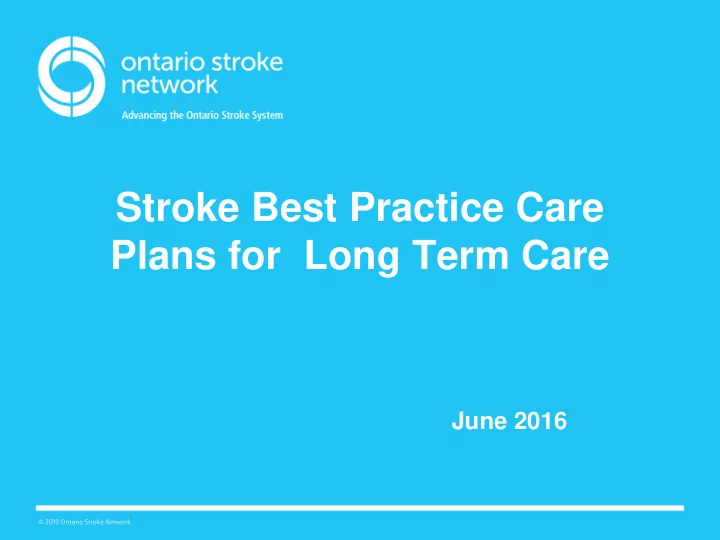

Stroke Best Practice Care Plans for Long Term Care June 2016
Str Strok oke e Best Pr Best Practice actice for or Long Long-Ter erm m Car Care e 2010 RAI-MDS LTC 2012 - 2015 2011 - 2012 implementation Stroke Care completed. Stroke Care Plans 2015 Plans Heart and Stroke developed by LTC Heart and Stroke implemented in Foundation of & Ontario Stroke Foundation LTC Homes Ontario releases System reps and Taking Action for across Ontario Tips & Tools for piloted in 4 LTC 2015 - 2016 Optimal Everyday Living Homes Stroke Care Community & Plans updated Long-Term Stroke and released Care March 2016 released 2
Stroke in Long Term Care Of every 100 people who have a stroke: • 15 die • 10 recover completely •‘ 25 recover with a minor impairment or disability • 40 are left with a moderate to severe impairment • 10 are so severely disabled they require long- term care (Quality Based Procedures: Clinical Handbook for Stroke, 2015) • 21.3% of residents in LTC have had a stroke (Continuing Care Reporting System, CIHI, 2014-15). • Stroke is the third most common diagnosis in long-term care (Price Waterhouse Cooper 2001).
Taking Action for Optimal Community & Long-Term Stroke Care (TACLS) • Developed by Heart & Stroke Foundation • Released 2015 • Reflects the Canadian Stroke Best Practice Recommendations • Evidence-based resource • Provides guidance for the provision of best practice stroke care in LTC and community setting http://www.strokebestpractices.ca/wp-content/uploads/2016/01/HSF_F15_TACLS_booklet_EN_FINAL-LR_Linked-all- sections-23Dec15.pdf
Adding It Up RAI MDS + Taking Action for Optimal Care in Community & Long Term Stroke Care (TACLS ) = Best Practice Stroke Care Plans
Project Progression Initial Project 2010/11 Care Plan Update 2015/16 • Working groups included • Initial revisions by Regional representatives from LTC and Ontario Stroke Network Community & Stroke System Long-Term Care Coordinators (CLTCs) • LTC reps from across Ontario • Revisions based on TACLS including rural/urban settings and various disciplines (e.g. DOC, PSWs, resource and changes in LTC RAI Coordinators) practice/Regulations • 12 Stroke Care Plans based on the • Drafts to working group of LTC Tips and Tools resource were and CLTC reps developed and linked to RAI MDS • LTC reps included Outcomes Scales administrative, front line and • Reviewed by Compliance Director, RNAO LTC Best Practice Retirement Home Regulatory Coordinators Authority, Ministry of Health and Long • Final revisions by CLTCs Term Care
The Stroke Care Plans Stroke Care Plans • Activities of Daily Living • Behaviour Change • Bladder and Bowel Continence • Cognition • Communication • Depression • Leisure • Mobility, Positioning & Transfers • Nutrition, Hydration & Swallowing • Pain • Perception • Skin Care & Hygiene
Stroke Care Plans for LTC - Format Focus Goal Interventions Accountability Timelines Uses PESS SMART format A restorative, Specific team Timelines (problem, written from the interdisciplinary members must should not resident’s etiology, approach. be identified for automatically signs, perspective (e.g. each intervention coincide with symptoms). what resident will to reflect the care reassessments do, look like, model and care (i.e.q3months). etc.), reflects the team for each Timelines are to RAI-MDS LTC Home. be related to resident’s goal Outcome Scales and includes or goal prompts to assessment. individualize goals.
Stroke Care Plans for LTC • clear, action-oriented language • word format to allow for individualization • integration of plans in whole or embedded in existing plans • relevant chapter(s) from Taking Action for Optimal Community & Long Term Stroke Care™ are referenced for each focus • additional best practice resources are listed for each Care Plan
Pilot of Care Plans 2011/12 • Four pilot sites were a mix of urban and rural facilities • Positive results from pilot evaluation “ The opportunity to ensure that our care planning contained best practices and an evidence base was the foundation for us to move forward in this project.” – Pilot Home
Pilot Project: Evaluation • 95.8% of respondents indicated that the stroke care plans enhanced their ability to care for stroke residents to varying degrees. • Care plans on transfers and mobility, perception, cognition, pain and communication were found to be particularly useful. • Pilot homes reported an increase awareness and uptake of best practice stroke care.
Pilot Project (2012): Feedback “This resource ( Tips and Tools for Everyday Living) has been an extremely beneficial tool which assisted staff to understand brain physiology, risk factors, stroke impact on life and how the care team can affect resident outcomes.” - Pilot Home “Tips and Tools for Everyday Living provided an evidence based approach for team members to assist the stroke survivor to achieve the optimal wellness level and their full potential. Our staff repeatedly expressed the value of this resource.” - Pilot Home
Care Plan Implementation : 2012 – 2015 • Following pilot, Stroke Care Plans have expanded into additional LTC Homes including independent and corporate Homes • Response to Stroke Care Plan implementation continues to be positive “The development and roll out of the Stroke Care Plans across our organization has been very beneficial to not only the recipients of this very individualized care but also for the interdisciplinary teams providing the care. They have provided us with key areas of focus for those individuals who have experienced a stroke as well as measureable goals and interventions that can be tailored to individual residents.” ~ March 2015
Implementation Toolkit Contents: • Background • Stroke Care Plans • Implementation Tips • Frequently Asked Questions • Stroke Care Plans - PowerPoint Presentation www.ontariostrokenetwork.ca
Future Opportunities • Explore research opportunities (e.g., impact of Care Plans on Depression Rating Scale). • Initial discussions re adaptation of Care Plans to community setting. • Explore opportunities to collaborate with software companies to integrate care plans into existing libraries. • Expansion of plans to national basis. • Collaborating with Accreditation Canada and the Commission on Accreditation of Rehabilitation Facilities (CARF)
QUESTIONS
CONTACT
Recommend
More recommend